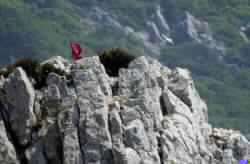Spain indicated Sunday that it would not use force to get Morocco to withdraw troops from an abandoned flyspeck island on the North African coast, despite its deployment of four warships nearby. Deputy Interior Minister Pedro Morenes flew into the area to reassert his country's claim to Perejil Island and seek support from allies in pressuring Morocco. He told reporters that Morocco should "understand that its attitude is truly inadmissible."(Read photo caption)
Twelve Moroccan troops landed on the island Thursday and raised national flags. Spain responded Saturday by deploying the war vessels.
Spain would only resort to measures that conform to "what civilized countries try to do in this type of conflict," Morenes said during a visit to Ceuta, a Spanish enclave on the North African coast just three miles from Perejil.
On Monday, Morenes was scheduled to visit Melilla, another enclave further up the coast.
Madrid sent a fourth warship to protect Ceuta and Melilla, so-called "autonomous cities" of Spain, separated from the Iberian peninsula by the Strait of Gibraltar.
The warship Numancia was deployed from Rota, a naval base shared with U.S. forces on the Spanish side of the strait, to join two corvettes and another frigate dispatched for the mission.
Foreign Minister Ana Palacio said in a newspaper interview published Sunday that the deployment was symbolic.
She told El Mundo that she wanted to resolve the incident in a reasonable way.
The minister reminded the Moroccan government that 250,000 of its citizens live in Spain and that the two countries have maintained a Treaty of Friendship and Cooperation since 1991.
The European Union also called on Morocco to withdraw its troops immediately from Perejil, and gave full backing to Spain's claim.
MOROCCO ALSO TRIES TO COOL TENSIONS
Moroccan Prime Minister Abderrahmane Youssoufi promised Saturday in Rome to "work to find a rapid solution" to "avoid making the conflict more dramatic," according to news reports.
Morocco said it set up an "observation post" on Perejil, which it calls Leila, "to fight terrorism" as well as illegal migration into Europe across the 12-mile Straits of Gibraltar separating Spain from Africa.
Moroccan Communications Minister Mohamed Achaari, in an interview with Madrid's El Pais newspaper, said the Spanish government had "exaggerated" its reaction to the incident.
"There is no reason to create a drama," he said. "Morocco wants to use an island under its sovereignty in a different manner to fight more efficiently against the trafficking of immigrants and terrorism."
Madrid and Rabat are at odds over illegal immigration, drug trafficking across the Straits and fishing rights.
Perejil Island, which Moroccans call Leila, lies several hundred yards from Morocco's coast.
The island, which is a half-mile in diameter, has belonged to Spain since 1668, but is claimed by Morocco. There has been no Spanish presence on the island for the last 40 years.
The incursion came as Morocco held several days of celebrations for King Mohamed VI's wedding. The festivities were boycotted by Spain.
It also comes after London said for the first time that it is willing to share sovereignty over Gibraltar, another strategic point which Spain has been trying to regain ever since it was captured by the British in 1704.
PHOTO CAPTION
A Moroccan flag is seen high on the rocks on Spain's Perejil island off Morocco on Sunday, July 14, 2002. Spain has sent four war vessels to the zone to protect Spain's two city enclaves Ceuta and Melilla along Morocco's northern coast after twelve Moroccan soldiers landed on Perejil island last Thursday and raised two Moroccan flags. The island, which is a half-mile in diameter, has belonged to Spain since 1668, but is claimed by Morocco. Mainland Morocco can be seen in background. (AP Photo/R. Perales)
- Author:
& News Agencies - Section:
WORLD HEADLINES


 Home
Home Discover Islam
Discover Islam Quran Recitations
Quran Recitations Lectures
Lectures
 Fatwa
Fatwa Articles
Articles Fiqh
Fiqh E-Books
E-Books Boys & Girls
Boys & Girls  Ramadan
Ramadan Fatwa Audios
Fatwa Audios Month of Mercy
Month of Mercy Women
Women Eed Al- Fitr
Eed Al- Fitr Food Recipes
Food Recipes Videos
Videos

 Prayer Times
Prayer Times












